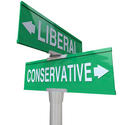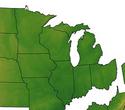While not immune to the recession, the upper Great Plains is in a different economic situation from the rest of the nation. Growth coupled with low unemployment means more strain on the region’s workforce, making it tougher for employers to find the workers they need. It's not so much about jobs anymore, but about finding the right workers. read more »
Economics
Data Spotlight: Ranking States by Their Dependence on Manufacturing
A recent Brookings paper makes a clear case from the start: “Manufacturing matters to the United States …” Other economists and econ bloggers aren’t so sure.
What’s clear, however, is certain states (think Indiana, Wisconsin, and Arkansas) depend on manufacturing to fuel their economies more than others. One way to measure just how dependent states are on manufacturing – rather than simply looking at total jobs or exports – is by looking at a common concentration measure known as location quotient (LQ). read more »
- Login to post comments
The Expanding Wealth Of Washington
Throughout the brutal and agonizingly long recession, only one large metropolitan area escaped largely unscathed: Washington, D.C. The city that wreaked economic disasters under two administration last year grew faster in population than any major region in the country, up a remarkable 2.7 percent. The continued steady growth of the Texas cities, which dominated the growth charts over the past decade, pales by comparison. read more »
Rick Santorum’s Ugly Appeal to Rural Voters
Not all of them are “clinging to guns and religion,” as Barack Obama famously said in 2008, but Rick Santorum has catapulted to the top of the Republican field by connecting with a bitter streak among rural voters. This is bad news for the Republican party and for rural America, which in fact has some pretty good reasons to be optimistic. read more »
Measuring the Impact of Apple and the App Economy
We all know about the explosion of Apple tech products, the ever-expanding number of mobile applications in the App Store — and the near $100 billion in cash that Apple is hoarding. Yet one question that has gone mostly unanswered is how many jobs Apple has generated (and supported) with its mind-boggling growth. read more »
Foreign Industrial Investment Is Reshaping America
Declinism may be all the rage in intellectual salons from Beijing to Barcelona and Boston, but decisions being made in corporate boardrooms suggest that the United States is emerging the world’s biggest winner. Long the world leader as a destination for overseas investment, the U.S. is extending its lead as the favored land of overseas capital. read more »
Will Millennials Still be Liberal When They’re Old and Gray?
The Millennial Generation (born 1982-2003) is the cohort most in favor of using the federal government to promote economic stability and equality since the GI Generation of the 1930s and 1940s. The attitudes of Millennials were heavily shaped by the protected and group-oriented way in which they were reared and their experience of feeling the full brunt of the Great Recession as they emerged into adulthood. read more »
- Login to post comments
The State of the Anglosphere
The world financial crisis has provoked a stark feeling of decline among many in the West, particularly citizens of what some call the Anglosphere: the United States, Canada, the United Kingdom, Ireland, Australia, and New Zealand. In the United States, for example, roughly 73 percent see the country as on the wrong track, according to an Ipsos MORI poll—a level of dissatisfaction unseen for a generation. read more »
The Growth In Science & Research Occupations
Local economic developers and policy pundits often point to scientific and research jobs as an important part of regional economies and a critical driver of innovation for the nation's economy. As we continue to filter through the data in our latest release (built on nearly 90 federal and state data sources), we notice that many occupations related to science and research are doing quite well. read more »
Clues from the Past: The Midwest as an Aspirational Region
This piece is an except from a new report on the Great Lakes Region for the Sagamore Institue. Download the pdf version for the full report including charts and maps on the region.
The American Great Lakes region has long been a region defined by the forces of production, both agricultural and industrial. From the 1840s on, the region forged a legacy of productive power, easily surpassing the old northeast as the primary center of American industrial and agricultural might. read more »






















